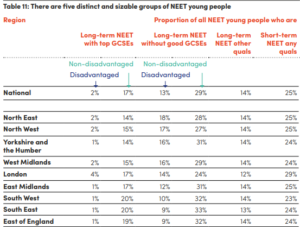As part of their ongoing Youth Jobs Gap series, Impetus has released a sixth report exploring the long-term NEET population.
Key findings
This research finds that:
- Most NEET young people are long-term NEET – 75% of young people who are not in education, employment or training (NEET) for 3 months have been NEET for 12 months
- Over half of long-term NEET young people do not have good GCSEs (fewer than five GCSEs at A*-C, and lacking at least one of English and maths)
- Only 10% of young people who have been NEET for three months will have moved into a positive EET destination after a further three months – and only around 25% will have done so after a further nine months
Commentary
Previous briefings from this series found that disadvantaged (eligible for free school meals in year 11) young people are twice as likely to be NEET than their ‘better-off’ peers. Read our previous commentary
This recent analysis appears to identify that the trend continues in the long-term. Disadvantaged young people represent 26% of the long-term NEET population nationally, despite being only 16% of the population. And they’re more likely to remain NEET than their ‘non-disadvantaged’ peers too. We know from the first of these reports that there is an employment Gap for disadvantaged young people – they are twice as likely to be NEET as their ‘better off’ peers, and while half of this can be explained by qualification, half cannot.
What would a NEET strategy look like/ Recommendations:
- Preventing young people from becoming NEET in the first place, identifying young people most at risk of unemployment and providing them with a dedicated coach from age 13 to 18.
- Moving young people with lower barriers from NEET to EET more quickly with targeted, tailored support.
- Providing more and better support designed for people who are long-term NEET.
This important research series compounds/confirms many of the issues we see, with a series of complex factors at play. There is no one size fits all approach to solving youth employment. This latest briefing re-enforces the findings of previous briefings; that the regional differences are often less pronounced than differences within regions. As such, there is no “better” region to be NEET in.
Again the most important thing to note for policymakers is the granularity. For example, the largest share of the National NEET population are long-term NEET, non-disadvantaged and low qualified young people (29%, see ‘Table 11’ below). Each region, with London as the sole exception, reported this NEET group as the most prevalent proportion of the NEET population.
We recognise the challenges individual young people face and welcome this approach to prevention of NEET young people and the targeting of short term and long term NEET young people. As an organisation committed to reducing youth employment in the UK we:
Champion youth friendly best practice and connecting young people with Youth Friendly Employer’
Supporting young people to develop their skills and access impartial careers information
Influencing and supporting the political agenda to ensure that youth employment remains a government priority, and that the views of young people and our Youth Friendly Employer Community are being heard.












